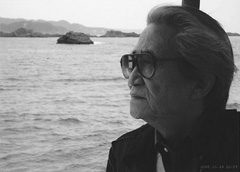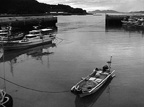Cinema Is about Documenting Lives: The Works and Times of Noriaki Tsuchimoto
(“Eiga wa ikimono no kiroku de aru: Tsuchimoto Noriaki no shigoto”) JAPAN / 2007 / Japanese / Color, B&W / Video / 94 min / Subtitled in English
JAPAN / 2007 / Japanese / Color, B&W / Video / 94 min / Subtitled in English
Director, Editing: Fujiwara Toshi
Photography: Kato Takanobu
Associate Director: Imada Satoshi
Interviewer: Ishizaka Kenji
Sound Design: Kubota Yukio
Planning, Producer: Fuseya Hiroo
Production Company, World Sales: Visualtrax
A documentary about film director Tsuchimoto Noriaki, who has continually covered the story of Minamata. This work follows Tsuchimoto to present-day Minamata, while incorporating footage from the Minamata series, including Minamata: The Victims and Their World (1971) and The Shiranui Sea (1975), as well as the director’s comments on the filming of his pre-Minamata works An Engineer’s Assistant (1963) and Document: On the Road (1964). This film confronts Tsuchimoto as he continues to question the significance of documenting and reflects on the present lives of patients depicted in past films and the (presumably) incomplete history of Minamata. And this young filmmaker’s intentions are . . . ?
 [Director’s Statement] When I decided to make a film about Tsuchimoto Noriaki, the materials available were the films that Tsuchimoto made in the past, and Tsuchimoto’s own face in the present, bearing the memories of these pasts. And now I have the images of Minamata as documented by Tsuchimoto over thirty years ago, and my camera documenting Tsuchimoto walking in Minamata today.
[Director’s Statement] When I decided to make a film about Tsuchimoto Noriaki, the materials available were the films that Tsuchimoto made in the past, and Tsuchimoto’s own face in the present, bearing the memories of these pasts. And now I have the images of Minamata as documented by Tsuchimoto over thirty years ago, and my camera documenting Tsuchimoto walking in Minamata today.
The camera is a cruel machine. We may control what is in the frame, but the lives as seen through that frame are captured mechanically as they are. The irreversible passing of time between these two eras, the changes the world has gone through, are engraved mercilessly in the cold-hearted Kino Glaz.
I myself, born in 1970, know so little about this time gone by. That is why I would like to dedicate this film to my father and mother, who became parents for the first time the same year Tsuchimoto first filmed in Minamata, in 1965, and also to the people of their generation who built the Japanese postwar.
 Fujiwara Toshi
Fujiwara Toshi
Born in 1970 in Yokohama, Fujiwara grew up in Tokyo and Paris. He has been a film critic, book translator, and film subtitler since the mid-90s. in 2001, Israeli filmmaker Amos Gitai asked him to direct the making-of documentary for his fictional film Kedma. This became Fujiwara’s first film, Independence: Around the Film Kedma a Film by Amos Gitai, questioning the role of national identities and histories in modern conflicts. Since then, he has directed another portrait documentary of Gitai, and also made a number of television documentaries on Japanese documentary filmmakers. In 2006 Fujiwara made two films, the documentary Cinema Is about Documenting Lives, and the internationally acclaimed, entirely improvised fiction film We Can’t Go Home Again, screened at the Berlin International Film Festival. He now is completing a new documentary, Fence, focusing on the US Navy housing complex located in Zushi City in Kanagawa Prefecture. |
